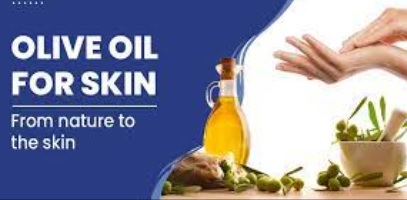Olive Oil Benefits for Skin

Olive Oil Benefits for Skin
The Olive oil is a miracle of nature, used in countless ways. It has been used for thousands of years as a source of nourishment and food and a skin soothe.
It has been demonstrated to lessen inflammation, get rid of acne, encourage the creation of healthy skin cells, and even lessen psoriasis and eczema symptoms.
Olive oil contains a wealth of beneficial fats, vitamins, and antioxidants that can help promote younger-looking skin. It helps keep moisture in the skin and its antioxidants can reduce the appearance of aging.
Given all these amazing advantages, it makes sense that olive oil is a common ingredient in beauty regimens. For this reason, we’ve put together all the information you require on using olive oil on your skin.
What is olive oil?
Olive oil is extracted by pressing the olive fruit. As explained by Dr. Lorenc, it has antioxidants that are great for the skin and is high in monounsaturated fatty acids, which are beneficial fats that have different health and cosmetic benefits.
Olive oil is considered to be one of the best plant oils due to its moisturizing and emollient qualities. This miracle oil is present in a wide variety of skincare products, from serums to facial cleansers, and is also sold separately with humectants.
Olive oil can be damaged by exposure to high temperatures, bright light, or air, so it’s best to keep it in a dark, cold place with a well-sealed cover.
Olive oil benefits
As of right now, the following are known advantages of olive oil for skin:
- Lifts makeup: Dr. Lorenc says that “olive oil works great for breaking down waxy substances like waterproof mascara and eyeliner.”
- “With the added benefits of antioxidants and hydrating squalane, it moisturizes the delicate skin in the eye area, plus nourishes eyelashes the same way conditioner works on the hair.”
- Prevents water loss: According to cosmetic chemist Ee Ting Ng, “olive oil’s main benefit is to moisturize the skin by reducing water loss.” “This moisturization increases the skin’s water content, improving its health and appearance.”
- Prevents environmental damage: According to Ng, “the antioxidant qualities of olive oil shield skin cells from environmental damage and inflammation.” “This means protection against premature aging and signs of irritation or redness.”
- Olive moisturizes the skin: Vitamin E and squalene are found in olive oil. While vitamin E improves the skin’s ability to absorb and hold onto water, squalene helps the skin maintain its moisture content
- Lessens aging symptoms: Antioxidants found in olive oil are abundant. These substances can fight oxidative stress, which is linked to aging skin. They may also help the skin’s collagen levels rise.
Other benefits of olive oil for the skin include:
- Research suggests that olive oil may help pressure ulcers and diabetic foot ulcers heal more quickly,
- Olive oil has a plethora of advantages for the skin, from hydrating parched areas to removing stubborn makeup,
- Aids in skin cleansings,
- Encourages the healing of wounds.
It’s important to use high-quality olive oil.
Different kinds of olive oil have different tastes and effects. Olive oil’s beneficial lipids and nutrients can be altered depending on how it’s processed. It alters how it tastes as well.
To obtain EVOO, olives must be cold-pressed. It is therefore extracted from whole olives without the use of heat or chemicals. “Olive oil” is a common label for refined olive oil.
It could be composed of a blend of plant oils and olive oil or processed using chemicals. Its health benefits may decrease as a result. Extra virgin and refined olive oils can be combined to produce virgin or fine olive oil.
Less-ripe olives are also frequently used to make it. Stores might not carry this type.
Compared to conventional olive oil, EVOO may retain more of the olive oil’s nutritious characteristics during production, and it may contain fewer additives or other substances.
Olive oil and skin care
Eating olive oil and using olive oil in skin care products may both be beneficial.
How to Use Olive Oil for Skin
You can begin using olive oil in your skincare routine in one of two ways. To begin, you may purchase items that have olive oil as one of their primary ingredients. These days, olive oil is a common ingredient in face moisturizers, soaps, and cleansers.
Alternatively, you might use the olive oil that’s currently in your pantry.
To use olive oil on your skin conduct a patch test first: Applying a few drops of olive oil to a tiny area of skin and watching it is a simple approach to find out if your skin can withstand the therapy.
It should be safe to try on a bigger patch of skin if, after one to two days, you do not observe any skin responses.
Then you can use it as a moisturizer for the body
How to moisturize your skin with olive oil:
- Select premium extra virgin olive oil that is free of artificial additives.
- After cleansing, dab a tiny bit onto your skin—a little goes a long way.
- With a fresh cloth, remove any extra oil.
It’s crucial to get rid of extra oil since it keeps your pores from getting clogged. Breakouts may be caused by clogged pores.
You can use olive oil as a moisturizer for the face
When your skin feels dry, you can use olive oil as needed or as part of your regular skincare routine. After cleansing, apply a thin layer of moisturizer on your face. Use olive oil before makeup and after lotion application to help seal in moisture.
If you use sunscreen every morning, blot away any extra by applying a little layer of olive oil just before applying the sunscreen.
As a hand-soothing cream: Another choice is to dab tiny amounts of olive oil throughout the day on any particularly dry spots on your skin, like your hands. For instance, after cleaning the dishes, you could put a few drops of oil on your hands.
Olive oil as a makeup eliminator: At the end of the day, olive oil can also be used to assist in removing makeup that is difficult to remove. It naturally removes makeup from your skin, increasing the effectiveness of your everyday cleanser.
As a shave lotion: Olive oil can be used to moisturize skin before shaving, just like it can be used to moisturize the body. Apply it to your skin instead of shaving foam or gel. Afterward, gently cleanse the area to prevent clogging your pores.
Here is a detailed breakdown of how to apply olive oil to your skin:
- Wash your skin and then exfoliate it.
- Olive oil and water should be combined in a basin or cup at a 1:1 ratio. To get the finest results, use extra virgin cold-pressed olive oil.
- Using your fingertips, gently rub the mixture onto your face and neck in circular motions. When massaging the mixture into your skin, try not to massage too hard or forcefully since this could result in irritation or inflammation.
- After around fifteen minutes, remove the olive oil and water mixture with lukewarm water.
- If you want to further soothe your skin, splash it with cold water afterward. Then, pat it dry with a soft cloth.
- After using this treatment, moisturize using olive oil alone or a lighter moisturizer until you can determine how often you need to do so to be moisturized without clogging your pores with extra oil.
Olive oil benefits for skin whitening
The effects of extra virgin olive oil (EVOO) on skin lightening are negligible. It doesn’t accelerate the exfoliation of dead skin cells or lessen the pigment melanin. EVOO, however, can stop pigmentation and UV damage. It can also be used to alleviate skin wrinkles and redness.
Olive oil benefits for skin glow
The oil maintains the skin smooth and radiant while also preserving its elasticity. By keeping the skin hydrated during the winter, it keeps it from drying out. Squalene, which is present in it, aids in hydrating the skin. It eliminates blackheads and whiteheads by cleaning up clogged pores.
Olive oil benefits for skin before and after
When your skin feels dry, you can use olive oil as needed or as part of your regular skincare routine. After cleansing, apply a thin layer of moisturizer on your face. Use olive oil before makeup and after lotion application to help seal in moisture.
Benefits of olive oil on skin and hair ~ Olive oil benefits for skin and hair
The anti-inflammatory and anti-microbial qualities of olive oil can enhance the appearance and texture of your skin, making it softer, smoother, and healthier overall. It can also help to promote healthy hair.
Extra virgin olive oil benefits for skin
A wealth of beneficial vitamins—including vitamin E (which aids in fighting free radicals), vitamin A (which aids in regenerating skin), oleic acid (which makes skin soft and firm), and polyphenols (natural antioxidants that nourish and protect skin)—give it these beneficial properties.
Olive oil benefits for hair
Olive oil can strengthen hair follicles, repair damage, condition dry hair, and maintain manageable hair.
Stronger hair and reduced hair loss are the effects of this. Olive oil is supposed to improve general hair health, thus it will help grow hair faster even though there isn’t much evidence to support hair growth.

Olive Oil Alternatives
Many oils are available that provide that extra moisture boost without clogging pores or damaging the skin. They are lightweight, absorb quickly, and work well on most skin types—even those that are prone to acne.
- Jojoba Oil: it has a chemical structure that is almost the same as your skin’s natural sebum, or the oil you make naturally. In other words, it minimizes the look of pores, absorbs quickly, and cuts down on excess oil.
- Tea Tree Oil: tea tree oil is another excellent option for skin prone to acne. Tea tree is a terrific natural therapy for active pimples and a great way to stop fresh breakouts due to its inherent antibacterial characteristics.
- Maracuja Oil: has been shown to have anti-aging effects due to its high levels of vitamin C and other beneficial fatty acids.
Olive oil dangers on skin ~ disadvantages of olive oil on the face
Clogged pores, breakouts of acne, and allergic responses are common adverse effects of using olive oil on the skin.
If you have oily or combination skin, olive oil may be comedogenic, which means it can clog your pores and lead to breakouts. Furthermore, some people may be allergic to natural oils like olive oil, and if they use it, their skin may react or break out in hives.
- Clogged pores: Applying an excessive amount of olive oil to your skin may clog your pores and cause a breakout of whiteheads and blackheads.
- Skin irritation: Applying an excessive amount of olive oil to skin that is sensitive to it may cause redness or a burning feeling. Keep it out of your eyes, as it may irritate them even more.
- A greasy feel: If you use excessive amounts of olive oil on your skin, it may feel greasy or heavy all day. To avoid this feeling, make sure you start with a minimal amount and only use as needed.
Conclusion
There is disagreement over whether olive oil should be applied directly to the skin. “Olive oil is generally not the best option for a skin-care product,” explains Boston-based esthetician and proprietor of Anna Babayan Skincare Anna Babayan.
“Our skin does not have such enzymes to break down the molecules and allow the benefits of the olive oil to travel into the skin, and as a result, it just sits on top of the skin as a barrier layer and protects the skin from losing water.”
The only circumstances in which using olive oil as a protective component in your skin care regimen is advised are those in which your skin is extremely dry or damaged.
“Since people with dry skin types lack oil in their skin, the skin’s barrier layer is usually compromised,” says Babayan. “This can lead to water loss and deep dehydration in the skin—using olive oil can create an occlusion and not allow the water to evaporate from the skin.”
FAQs
What are the benefits of applying olive oil on the face overnight?
Applying olive oil on the face overnight benefits
The skin will get internally hydrated and moisturized if the oil is applied overnight. To enhance its benefits, olive oil can also be blended with other oils.
This will be very helpful in lessening the visibility of wrinkles and acne scars. Furthermore, it guards against environmental harm and early aging.
Does eating olive oil improve skin?
Eating olive oil benefits for skin
It takes more than just what you put on your skin to have healthy skin. It also has to do with the nutrients that your body can provide to your skin. Consuming even one tablespoon of olive oil daily supplies all the essential vitamins, antioxidants, and good fats required to maintain the health of your skin from the inside out.
Can I apply olive oil on my face?
“Olive oil is an excellent skin moisturizer, especially when applied to wet skin when the pores are open, and can act as a second skin barrier for dry, cracked skin in the winter.”15 Mar 2023
What happens if we apply olive oil on the face daily?
It both hydrates and inhibits microorganisms.
Using an olive oil-based soap can help reduce acne if you are prone to it by eliminating the bacteria that cause it. It’s also well known that olive oil hydrates and moisturizes skin.
Does olive oil make your face glow?
Skin specialists claim that olive oil when combined with other nutrients can help achieve naturally radiant skin.
What can I mix olive oil with for glowing skin?
Whatever the problem with your skin, olive oil’s calming qualities will take care of it. Equal parts of olive oil and honey should be combined and thoroughly blended.
After finishing, slather your face with a thick coating of this pack and let it sit for half an hour before washing it off with warm water.
Does olive oil make you look younger?
Olive oil helps maintain the youthful, healthy appearance of your skin by acting as an antioxidant and an anti-inflammatory. Additionally, it keeps your skin moisturized, which is crucial for delaying wrinkles. It’s also user-friendly and reasonably priced.
Can olive oil clear stretch marks?
Vitamin E and antioxidants abound in olive oil. Applying moisturizing oil to your skin regularly can help you build a barrier that will prevent stretch marks from appearing in the future.
Can olive oil remove pimples?
Olive oil has too much oleic acid in it to be a very good acne treatment, and the unfavorable side effects don’t seem to justify the benefits.
According to research, the best oils for moisturizing, protecting, and minimizing inflammation and skin irritation are those with high linoleic acid and low oleic acid.
Can olive oil remove dark spots?
In comparison, olive oil is less successful in curing black stains.
Olive oil is not very good at removing stubborn hyperpigmentation, although it does assist in brightening skin tone overall. Olive oil application to the skin will not prevent acne scarring, lighten dark markings, or treat acne scars.
Does olive oil contain SPF?
Oils Often Have Low SPF Values
most oils don’t have SPF values high enough to provide sufficient protection against damaging UV rays, as advised by health organizations. For your reference, the following oils have some of the highest SPF values, in accordance with this specific study.
Does olive oil darken skin complexion?
No, it essentially aids in lightening dark skin.
Which is better for skin coconut oil or olive oil?
In a study that was published in the journal Dermatitis, researchers discovered that when used as a carrier, coconut oil moisturized skin more effectively than olive oil. For your face or skin care, always go for cold-pressed, unrefined coconut oil.
Can I mix shea butter and olive oil?
Olive oil and shea butter are two highly common commodities that people utilize for a variety of purposes. Shea butter and olive oil work well together, and the combination is worth trying. Tell us more about the advantages of the same in the section below.
How long should I leave olive oil on my face?
After letting it sit for ten minutes, rinse it off with some warm water. Your skin will feel smooth and soft after using this mask to help moisturize and nourish it
How to use olive oil to fade dark spots?
Take two tsp. of turmeric powder, two tsp. of yogurt, and one tablespoon of cold-pressed olive oil. Follow the steps below:
- Combine them into a paste and
- Use a circular motion to massage it into your face,
- Give it twenty minutes,
- After washing it off with warm water,
- Pat your face to dry.
Can I mix olive oil and honey for the skin?
Olive oil can be used as a moisturizer on its own or combined with other anti-aging and anti-inflammatory substances, like honey. Because olive oil promotes cell formation, its antioxidants may help prevent premature aging.
Does olive oil expire?
The good news is that olive oils have a significantly longer shelf life than other products; some can keep for up to 18 to 24 months before losing their flavor. Nonetheless, the shelf life of Extra Virgin Olive Oil is often about 12-18 months.


